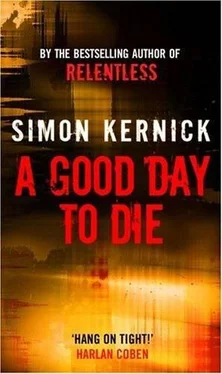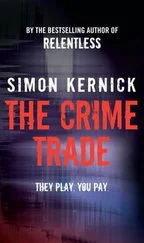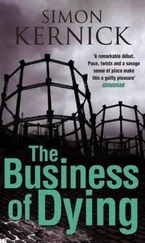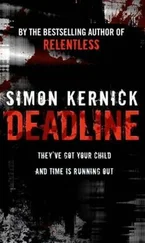Simon Kernick - A Good day to die
Здесь есть возможность читать онлайн «Simon Kernick - A Good day to die» весь текст электронной книги совершенно бесплатно (целиком полную версию без сокращений). В некоторых случаях можно слушать аудио, скачать через торрент в формате fb2 и присутствует краткое содержание. Жанр: Триллер, на английском языке. Описание произведения, (предисловие) а так же отзывы посетителей доступны на портале библиотеки ЛибКат.
- Название:A Good day to die
- Автор:
- Жанр:
- Год:неизвестен
- ISBN:нет данных
- Рейтинг книги:3 / 5. Голосов: 1
-
Избранное:Добавить в избранное
- Отзывы:
-
Ваша оценка:
- 60
- 1
- 2
- 3
- 4
- 5
A Good day to die: краткое содержание, описание и аннотация
Предлагаем к чтению аннотацию, описание, краткое содержание или предисловие (зависит от того, что написал сам автор книги «A Good day to die»). Если вы не нашли необходимую информацию о книге — напишите в комментариях, мы постараемся отыскать её.
A Good day to die — читать онлайн бесплатно полную книгу (весь текст) целиком
Ниже представлен текст книги, разбитый по страницам. Система сохранения места последней прочитанной страницы, позволяет с удобством читать онлайн бесплатно книгу «A Good day to die», без необходимости каждый раз заново искать на чём Вы остановились. Поставьте закладку, и сможете в любой момент перейти на страницу, на которой закончили чтение.
Интервал:
Закладка:
I came out from behind the people-carrier and crossed the road, moving quickly. An eight-foot-high wooden fence at the side of the house joined Pope's place with his neighbours', blocking access to the rear of both properties. Presumably a deterrent to casual burglars, it was never going to stop the more determined intruder, and it didn't stop me. I jumped up, grabbed the top and hauled myself over with only the minimum of fuss.
Pope's back garden was small and square, with half of it paved. A large, near-impenetrable leylandii hedge at the end obscured whatever it was that the garden backed onto.
I crept round to the back of the house and found myself staring through half-pulled blinds into a substantial and surprisingly tidy kitchen-diner, with plenty of gleaming pots and pans hanging from hooks above gleaming work surfaces. It looked like something out of a cookery show. For a man under pressure, Pope wasn't letting things go. A single ceiling light was on, but the room was empty and the door at the far end was shut.
Now for the hard part: getting in. Once upon a time, people were a little bit slack about their home security, making breaking-and-entering an altogether simpler affair, but in the last two decades burglary had become endemic in England, so now everyone was a lot more careful. Doors and windows were far more secure. Alarms were commonplace. People made sure they double-locked everything.
Life for your casual burglar, just like your casual car thief, had become far more difficult, which was why successive governments were always harping on about the fact that under their careful stewardship, overall crime was on the way down (they never mentioned the fact that violent crime was on the way up, as frustrated thieves started targeting people rather than their property). But you always got one idiot, someone who didn't listen to the advice of the crime-prevention officers, and it looked like I'd found him.
The back door of Pope's place was locked, but I could see a key poking out of the lock itself. I took my notebook out of my pocket and ripped out a blank page, then knelt down and pushed it through the gap at the bottom of the door until only an inch or so of it was showing. Getting back up, I dug out the Swiss Army knife I'd bought the previous day in Oxford Street and located the smallest screwdriver. It was then simply a matter of fiddling in the lock with the screwdriver until the key was dislodged on the other side, a process that took about ten seconds, but only because I was a bit rusty. When the key hit the paper, I bent down and pulled it back through. And that was it, I was in.
I shut the door gently behind me and crossed the kitchen. The house was silent and it was obvious that, unless he was hiding under his bed hoping all his problems would go away, Les Pope wasn't here.
I stopped at the kitchen door and listened again, but the silence remained. At least, that is, until I opened the door. As I did this, one of the alarm's motion sensors picked up the movement, and the silence was shattered with a high-pitched, metallic shriek. Ignoring the noise, I strode into the hallway, found the light switch, then went through the ground floor opening doors, knowing what I was looking for.
The telephone rang. This would be the firm managing the alarm system responding to the message sent to their control room that the alarm had been tripped. Their next call would be the police, but I wasn't too concerned about this. Burglar alarms going off are not a top priority for the Met, because they're usually tripped by accident. Unless I was very unlucky, it would be twenty minutes at least before someone arrived. More of a concern were the neighbours. I checked my watch and decided to give myself two minutes.
I found the study at the front of the house, and went straight over and closed the curtains before switching on the lights. There was a large and immaculately tidy antique desk facing one of the walls, with well-stacked bookshelves directly above it. One of the other walls was also lined with bookshelves, while the third contained a number of photos hanging in frames.
I tried the desk drawers but they were all locked, then had a quick shuffle through the thick piles of paperwork stacked in boxes marked IN-TRAY and OUT-TRAY. But in the few seconds I had, I didn't see anything of interest. Turning round, I scanned the photos on the opposite wall. One man appeared in most of them, and it made me think that either Tomboy hadn't seen him in a long time, or, more likely, he was trying to hide something from me, because Les Pope — and I was sure it was him — was a supremely ugly individual. A twelve-by-eight colour photo of him standing next to an ex-footballer I recognized, but couldn't put a name to, had pride of place on the wall. Pope was grinning from ear to ear, while the footballer just looked vaguely embarrassed, his eyes drifting towards one of Pope's pudgy hands which had appeared round his shoulder. I could sympathize with the footballer's plight. Pope might have been in his early forties but he looked nearer fifty. He was balding fast, even though wedges of oily black-grey hair were combed across his pate in a desperate bid to stave off the inevitable, and his features all seemed misshapen and oversized, as if they'd been very badly moulded. His face sagged; his lips were like chipolatas; and his crooked, snub nose was the largest of its kind I'd ever seen. Only the eyes — big, blue and smiling — acted as redeeming features.
Either way, he was now going to be extremely easy to recognize.
I started to turn away, knowing that time was running short. Then I stopped and did a double-take.
A photo higher up the wall had caught my eye. It was black and white, in a dark wood frame. Quite how I noticed it I still don't know, since it hardly stood out. A group of men on a golf course, posing in front of the clubhouse. Seven or eight of them standing in a row, smiling as they faced the camera. I looked again, closer this time, but there was no mistake. You don't forget the faces of men you've killed, and you don't forget the face of a man who's asked if you can supply him with a young girl to murder. When Les Pope had been setting up the execution of Richard Blacklip in a Manila hotel room a year ago, he'd claimed that he'd been acting on behalf of someone the target had abused as a child. That was what Tomboy had told me, anyway.
But here were Blacklip and Pope in a photo together, only one person between them.
I pulled it down from the wall, roughly removed the frame and folded the picture in half before shoving it into the back pocket of my jeans.
There was movement outside the window. Torchlight. Then a knock at the front door. It was time to go.
I retreated swiftly through the house and out the back door, not bothering to shut it behind me, then made straight for the leylandii at the back of the garden. I couldn't hear any movement behind me and I didn't look back.
Three minutes later I was through the hedge, across someone else's back garden and out onto a different street.
No one followed. 'I'm changing the time,' I told Les Pope when he picked up his phone. 'It's now six thirty. Same place.'
'Listen, I've got a better idea,' he said quickly.
'I bet you have. The problem is I'm not interested in hearing it. It's six thirty at the Cambridge Arms. And if you get a call from the people who manage your home alarm, don't worry. Nothing's been stolen and the place is as tidy as I found it. Your desk's very neatly kept, by the way.'
'What the hell do you think you're doing?' he demanded, full of righteous indignation.
'You know exactly what I'm doing.'
'I'm not going to be blackmailed,' he blustered.
'What you're going to do is provide me with the information I want. Then I'm out of your hair. Six thirty. And don't try anything, or next time I visit your place I'll make sure you are in residence and then there really will be a mess.'
Читать дальшеИнтервал:
Закладка:
Похожие книги на «A Good day to die»
Представляем Вашему вниманию похожие книги на «A Good day to die» списком для выбора. Мы отобрали схожую по названию и смыслу литературу в надежде предоставить читателям больше вариантов отыскать новые, интересные, ещё непрочитанные произведения.
Обсуждение, отзывы о книге «A Good day to die» и просто собственные мнения читателей. Оставьте ваши комментарии, напишите, что Вы думаете о произведении, его смысле или главных героях. Укажите что конкретно понравилось, а что нет, и почему Вы так считаете.












